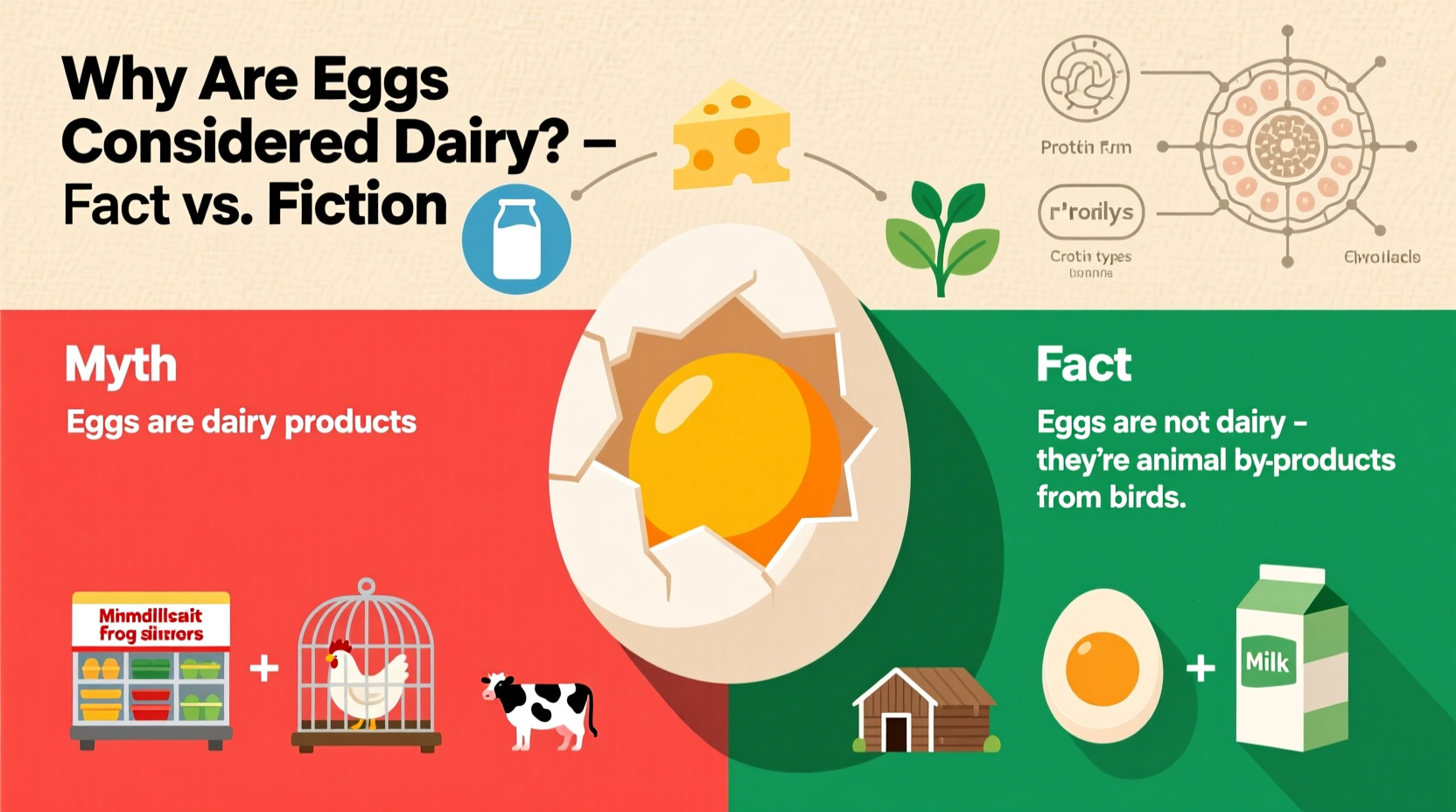Eggs have long been caught in a web of dietary confusion—often grouped with milk, cheese, and yogurt on grocery shelves and meal plans, leading many to assume they belong to the same food family. This misconception persists across households, restaurants, and even nutrition labels. But biologically, nutritionally, and agriculturally, eggs are not dairy products. Understanding this distinction is essential for people managing allergies, following specific diets, or simply seeking accurate nutritional knowledge.
The confusion stems largely from how foods are categorized in retail and culinary settings. Eggs sit near refrigerated milk; they appear alongside cheese in omelets; and both come from animals. Yet these surface-level associations don’t reflect biological reality. Clarifying the difference empowers consumers to make informed choices about what they eat and why.
What Defines a Dairy Product?

Dairy refers specifically to foods derived from the milk of mammals. This includes cows, goats, sheep, and buffalo. Common dairy products include milk, butter, yogurt, cheese, cream, and ice cream—all made from processed animal milk. The defining component of dairy is lactose, a natural sugar found in milk, along with milk proteins like casein and whey.
For a product to be classified as dairy, it must originate from mammary gland secretions. Eggs, by contrast, are reproductive cells produced in the ovaries of birds—most commonly chickens. They contain no milk, lactose, or mammalian secretions. Their composition is fundamentally different: primarily water, protein, fats, and micronutrients such as choline and vitamin D.
“Dairy comes from milk. Eggs come from hens. They are entirely different biological systems.” — Dr. Rebecca Thompson, Registered Dietitian and Food Scientist
Why the Confusion Exists
The misclassification of eggs as dairy isn’t random—it’s rooted in practical, logistical, and cultural factors:
- Retail Placement: Supermarkets often store eggs in the dairy section due to shared refrigeration needs and consumer expectations.
- Culinary Pairing: Eggs are frequently used with cheese, butter, or milk in dishes like quiches, custards, and pancakes, reinforcing perceived similarity.
- Animal-Origin Grouping: Plant-based diets sometimes group all animal products together, leading to oversimplification where “non-vegan” equals “dairy.”
- Labeling Ambiguity: Some food labels list “eggs and dairy” under allergens, further blurring distinctions despite being separate categories.
This conflation can lead to real-world consequences, especially for individuals avoiding dairy due to lactose intolerance or milk protein allergies. Mistakenly believing eggs contain dairy may cause unnecessary dietary restrictions or anxiety over cross-contamination that doesn’t exist.
Nutritional Comparison: Eggs vs. Dairy
While both eggs and certain dairy products are rich in protein and essential nutrients, their profiles differ significantly. Below is a side-by-side comparison of one large egg versus one cup (240ml) of whole cow’s milk:
| Nutrient | Large Egg (50g) | Whole Milk (240ml) |
|---|---|---|
| Calories | 70 kcal | 150 kcal |
| Protein | 6g | 8g |
| Fat | 5g | 8g |
| Carbohydrates | 0.6g | 12g |
| Lactose | 0g | 12g |
| Calcium | 25mg | 300mg |
| Vitamin D | 44 IU | 120 IU |
| Choline | 147mg | 38mg |
The data shows key differences: milk contains significant lactose and more calcium, while eggs offer higher choline content—a vital nutrient for brain health—and zero carbohydrates. These distinctions matter for those managing blood sugar, neurological function, or digestive sensitivities.
Allergies and Dietary Restrictions
Misunderstanding the egg-dairy relationship can have serious implications for people with food allergies. According to the American College of Allergy, Asthma & Immunology, milk allergy is one of the most common childhood food allergies, affecting about 2.5% of children under three. Egg allergy is also prevalent, particularly in young children, but it is immunologically distinct.
A person allergic to milk proteins (such as casein or whey) can typically consume eggs safely, and vice versa. However, confusion may lead caregivers to avoid both unnecessarily, limiting nutritional variety during critical growth periods.
Similarly, individuals following a dairy-free diet—whether due to lactose intolerance, ethical reasons, or medical conditions like Crohn’s disease—can still include eggs unless separately restricted. Conversely, vegan diets exclude both, but for different reasons: dairy involves exploitation of animal lactation, while eggs involve reproductive byproducts of poultry.
Case Study: Managing a Child’s Food Sensitivity
Sophia, a mother of a two-year-old with diagnosed lactose intolerance, was advised by her pediatrician to eliminate dairy. At first, she removed cheese, yogurt, and milk—but also stopped giving her son scrambled eggs after seeing them grouped together on a daycare menu labeled “contains dairy.” After consulting a dietitian, she learned eggs were safe. Reintroducing eggs improved her child’s protein intake and reduced mealtime stress. The takeaway? Accurate categorization supports better health outcomes.
How to Read Labels Correctly
Food labeling regulations vary globally, but in the U.S., the FDA requires the eight major allergens—including milk and eggs—to be clearly declared. However, manufacturers may use ambiguous phrasing like “may contain milk” or “processed in a facility with dairy,” which can confuse consumers.
Here’s how to navigate labels effectively:
- Check the Ingredients List: Look for milk-derived terms: milk, lactose, casein, whey, curds, ghee, etc. Eggs will be listed as “egg,” “albumin,” or “ovalbumin.”
- Review Allergen Statements: Phrases like “Contains: Milk” or “Contains: Egg” are mandatory when present.
- Don’t Rely on Section Placement: Just because a product is in the dairy aisle doesn’t mean it contains dairy.
- Be Wary of Processed Foods: Some pasta, baked goods, and sauces contain egg but not dairy—perfect for dairy-free eaters.
Common Myths Debunked
- Myth: “Eggs are dairy because they come from chickens, which are farm animals.”
Fact: Origin doesn’t define category. Beef comes from cows, but it’s meat—not dairy. - Myth: “Organic or free-range eggs are dairy-free, but conventional ones aren’t.”
Fact: All eggs, regardless of farming method, are non-dairy. - Myth: “If I’m allergic to dairy, I must avoid eggs too.”
Fact: Milk and egg allergies are immunologically separate. Always consult an allergist before eliminating foods.
FAQ
Are eggs vegetarian?
Yes, eggs are generally considered vegetarian as they are unfertilized and do not involve killing the hen. However, they are not vegan.
Can I eat eggs on a dairy-free diet?
Absolutely. Eggs are naturally dairy-free and safe for anyone avoiding milk products, provided there’s no separate egg allergy.
Why do some recipes call eggs “dairy”?
This is outdated terminology or casual misuse. Culinary professionals should distinguish between the two to prevent misinformation, especially in allergy-sensitive environments.
Conclusion: Clarity for Better Choices
Eggs are not dairy. They never have been, biologically or nutritionally. The persistent myth arises from convenience, tradition, and superficial associations—not science. Recognizing this distinction helps individuals manage allergies, adhere to dietary needs, and make informed decisions at the grocery store or restaurant.
Whether you're navigating a dairy-free lifestyle, raising a child with food sensitivities, or simply aiming to understand your food better, clarity matters. Don’t let outdated assumptions dictate your diet. Empower yourself with facts, read labels carefully, and embrace eggs as the unique, nutrient-dense food they are—without guilt or confusion.









 浙公网安备
33010002000092号
浙公网安备
33010002000092号 浙B2-20120091-4
浙B2-20120091-4
Comments
No comments yet. Why don't you start the discussion?